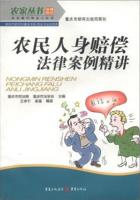Ath. The view which identifies the pleasant and the pleasant and thejust and the good and the noble has an excellent moral and religioustendency. And the opposite view is most at variance with the designsof the legislator, and is, in his opinion, infamous; for no one, if hecan help, will be persuaded to do that which gives him more painthan pleasure. But as distant prospects are apt to make us dizzy,especially in childhood, the legislator will try to purge away thedarkness and exhibit the truth; he will persuade the citizens, in someway or other, by customs and praises and words, that just and unjustare shadows only, and that injustice, which seems opposed tojustice, when contemplated by the unjust and evil man appears pleasantand the just most unpleasant; but that from the just man"s point ofview, the very opposite is the appearance of both of them.
Cle. True.
Ath. And which may be supposed to be the truer judgment-that ofthe inferior or of the better soul?
Cle. Surely, that of the better soul.
Ath. Then the unjust life must not only be more base and depraved,but also more unpleasant than the just and holy life?
Cle. That seems to be implied in the present argument.
Ath. And even supposing this were otherwise, and not as the argumenthas proven, still the lawgiver, who is worth anything, if he everventures to tell a lie to the young for their good, could not invent amore useful lie than this, or one which will have a better effect inmaking them do what is right, not on compulsion but voluntarily.
Cle. Truth, Stranger, is a noble thing and a lasting, but a thing ofwhich men are hard to be persuaded.
Ath. And yet the story of the Sidonian Cadmus, which is soimprobable, has been readily believed, and also innumerable othertales.
Cle. What is that story?
Ath. The story of armed men springing up after the sowing ofteeth, which the legislator may take as a proof that he can persuadethe minds of the young of anything; so that he has only to reflect andfind out what belief will be of the greatest public advantage, andthen use all his efforts to make the whole community utter one and thesame word in their songs and tales and discourses all their life long.
But if you do not agree with me, there is no reason why you should notargue on the other side.
Cle. I do not see that any argument can fairly be raised by eitherof us against what you are now saying.
Ath. The next suggestion which I have to offer is, that all ourthree choruses shall sing to the young and tender souls of children,reciting in their strains all the noble thoughts of which we havealready spoken, or are about to speak; and the sum of them shall be,that the life which is by the Gods deemed to be the happiest is alsothe best;-we shall affirm this to be a most certain truth; and theminds of our young disciples will be more likely to receive thesewords of ours than any others which we might address to them.
Cle. I assent to what you say.
Ath. First will enter in their natural order the sacred choircomposed of children, which is to sing lustily the heaven-taught layto the whole city. Next will follow the choir of young men under theage of thirty, who will call upon the God Paean to testify to thetruth of their words, and will pray him to be gracious to the youthand to turn their hearts. Thirdly, the choir of elder men, who arefrom thirty to sixty years of age, will also sing. There remainthose who are too old to sing, and they will tell stories,illustrating the same virtues, as with the voice of an oracle.
Cle. Who are those who compose the third choir, Stranger? for I donot clearly understand what you mean to say about them.
Ath. And yet almost all that I have been saying has said with a viewto them.
Cle. Will you try to be a little plainer?
Ath. I was speaking at the commencement of our discourse, as youwill remember, of the fiery nature of young creatures: I said thatthey were unable to keep quiet either in limb or voice, and thatthey called out and jumped about in a disorderly manner; and that noother animal attained to any perception of order, but man only. Nowthe order of motion is called rhythm, and the order of the voice, inwhich high and low are duly mingled, is called harmony; and bothtogether are termed choric song. And I said that the Gods had pityon us, and gave us Apollo and the Muses to be our playfellows andleaders in the dance; and Dionysus, as I dare say that you willremember, was the third.
Cle. I quite remember.
Ath. Thus far I have spoken of the chorus of Apollo and the Muses,and I have still to speak of the remaining chorus, which is that ofDionysus.
Cle. How is that arranged? There is something strange, at any rateon first hearing, in a Dionysiac chorus of old men, if you really meanthat those who are above thirty, and may be fifty, or from fifty tosixty years of age, are to dance in his honour.
Ath. Very true; and therefore it must be shown that there is goodreason for the proposal.
Cle. Certainly.
Ath. Are we agreed thus far?
Cle. About what?
Ath. That every man and boy, slave and free, both sexes, and thewhole city, should never cease charming themselves with the strains ofwhich we have spoken; and that there should be every sort of changeand variation of them in order to take away the effect of sameness, sothat the singers may always receive pleasure from their hymns, and maynever weary of them?
Cle. Every one will agree.
Ath. Where, then, will that best part of our city which, by reasonof age and intelligence, has the greatest influence, sing thesefairest of strains, which are to do so much good? Shall we be sofoolish as to let them off who would give us the most beautiful andalso the most useful of songs?
Cle. But, says the argument, we cannot let them off.
Ath. Then how can we carry out our purpose with decorum? Will thisbe the way?
Cle. What?
Ath. When a man is advancing in years, he is afraid and reluctant tosing;-he has no pleasure in his own performances; and if compulsion isused, he will be more and more ashamed, the older and more discreet hegrows;-is not this true?
Cle. Certainly.














